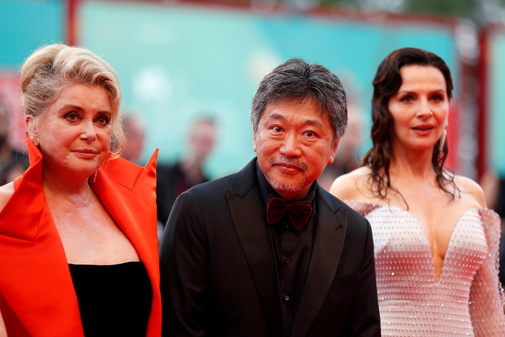- Venice: An unscrupulous Mostra: more Netflix, less women and two directors involved in rape cases
- Mostra of Venice.The president of the jury attacks the Mostra for programming Polanski and will not go to her gala
As everyone knows, the worst way to start a text is to quote Oscar Wilde . For that: "If it is not possible to do anything to control, or at least modify, our monstrous devotion to the facts, art will become sterile and beauty will disappear from the face of the earth," says Vivian, one of the speakers in The decay of lies. One comment (Cliff). The summary is that it is in the nature of art to lie if we do not want to turn artistic activity into a pamphlet that, after its debatable effort to reflect truth and life, ends up being the ugliest of lies. And therefore a real lie. Otherwise, it is the dignified life that imitates beautiful art and not vice versa . And so.
The truth , from Hirokazu Kore-eda , is about this. Rushing well could be considered an exhaustingly free and even unconscious adaptation of the brief and bright essay by the Irish author. It is also many more things, all of them, of course, consciously. In order: a) one of the brightest and smartest ways to inaugurate the current Mostra; b) the first film that the Japanese and recent filmmaker Palma de Oro for A family affair makes outside his home country (in Paris precisely); c) a warm and fiery tribute to the fiction in the skin of an actress the size of the always imperial Catherine Deneuve, seconded by Juliette Binoche and Ethan Hawke ; and d) a huge lie. But very, very true. This was what it was about.
To locate us, the film tells the visit of a daughter (Binoche) to a mother (Deneuve). The second is a great movie diva that has just published his memoirs (all lies) and the first is simply the daughter of the diva. While the meeting is taking place, which is also a disagreement, the autumnal interpreter works on a science fiction film that reflects among other things about the time that passes. And it pierces us. Something like Interstellar , but in French. What follows is not just a movie with a movie inside, not a life with as many thousand lives inside it, not even a filial love pregnant with every conceivable reconciliation and resentment. It is all that and something else, as indefinable as evident, that has to do with matters such as the transparent beauty of a magnificent lie (cinema, art ...) that can only be true. We have arrived.
The universe of Kore-eda
Kore-eda manages not to move a single comma from his universe without giving up growing by the hand of some different rules. Again, the family; again, the labyrinth of truth, and as always, the clarity to build complicity with both the world of childhood and that of old age. The syncopated sound of Japanese has nothing to do with the flow of French, but it doesn't even show. Moreover, play in favor. Grace this time is not to overdo it, to underline just the right thing between virtuous comedy and deep drama. The relevant thing is not the reflection by moral force or, rushing, metaphysics on such a serious matter, as the delicacy to sow each plane of questions, clues and even emotions . Each of the blunt responses of Deneuve's character disarms. Every inflection of his voice moves. And all to leave in just a click of Binoche lips the answer to the question that asks her little daughter about whether or not to lie.
The director's strategy is to let the viewer vibrate, or simply get lost, behind each of the uncertainties and regrets that his new French family inhabits. The armchair is invited to be confused in a scenario that is both representation and reality itself. We look at the character of Deneuve and it is impossible not to imagine Deneuve herself. Not in vain, the house he inhabits is populated with memories of his films, the ones we've all seen, those of Deneuve herself. And the same for Binoche. And the same for Hawke. The film is about actors and how their work leaks with life. But the path of reflection is outward, towards the sense of the gaze itself . And here, indeed, we are all.
That said, Kore-eda never ends. Neither in Japan nor in France. Neither in Cannes nor in Venice. Otherwise, an unbeatable festival start.
According to the criteria of The Trust Project
Know more- Italy
- movie theater
- Film reviews
CineGracia Querejeta: the circular path of three women
Cinema 'The infinite trench', the darkest night of the civil war
The heroine of time, of good weather

